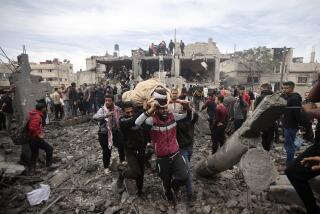Burbank-Based Group Shifts Its Focus to Refugee Camps
- Share via
Anwar Khan has ladled water into the hands of Sudanese women dying of thirst and trekked across deserts in Iraq to feed starving children.
As an aid worker for Islamic Relief, an international organization with U.S. headquarters in Burbank, Khan has stared into the face of misery before, he says, and has become steeled to it.
But when he visited refugee camps in Albania last week he was overcome by a new emotion: fury. Hearing stories of rape and brutality and seeing tens of thousands of people living on plastic sheets with nothing to put on their bread but salt left him outraged that the world had not done more to prevent this.
“Some of the other disasters took us by surprise, but not this one,” he said, referring to the 200,000 civilians, mostly Muslim, who were killed in the civil war in Bosnia-Herzegovina in the mid 1990s. “We knew that the atrocities in Bosnia were going to be just a sideshow to what could happen in Kosovo.”
Khan’s organization, which runs development projects across the Muslim world, has known for the past year about the trouble brewing in the Balkans. Islamic Relief is one of the most active aid organizations in the region, with one field office in Bosnia and three in Albania. Khan said he and his colleagues had received many dispatches from the field that indicated the Serbs were preparing to drive the predominantly Muslim ethnic Albanians out of Kosovo.
Now that the conflict has exploded, sending 230,000 refugees streaming across borders, Islamic Relief is shifting its focus from development projects to emergency help.
During his weeklong visit in Albania, Khan rushed from refugee camp to refugee camp helping with aid efforts and documenting what he saw.
He started in Kukes, the largest refugee camp in Albania, and met with emergency specialists from other agencies to discuss the logistics of registering refugees. Many relief workers had frayed nerves, and deep circles under their eyes, Khan said.
“There’s a real fear that we may run out of food,” Khan said. “My colleagues are worried they may not be able to cope.”
After Kukes, Khan drove through the mountains to Shkoder, in western Albania, where Islamic Relief is spearheading efforts to aid 5,000 refugees. Khan delivered kits of food--flour, oil, sugar and rice, along with meat if he could find any. Some of the relief shipments from America included canned ham, Khan said, which offended many of the mostly Muslim refugees because Islam prohibits the eating of pork.
Khan then trained his energies on the most ambitious project his organization is undertaking: building a tent city for 45,000 people. Islamic Relief expects a flood of refugees from northern Albania and the agency has ordered hundreds of tents and has begun clearing a site to build a huge camp.
Khan traveled with a video camera around his neck and a 35-millimeter camera in his pocket. He captured images of women with windburned faces and bloody feet. He videotaped stick-skinny children waiting for bread. He recorded the chaos near the Kosovo-Albanian border as trucks and tractors and jammed-packed cars unloaded their miserable cargo in the rain.
“The people just kept coming,” Khan said.
Khan plans to show his images at a fund-raiser this weekend in Buena Park in which Southern California Muslim groups hope to raise $300,000. Five years ago, Islamic Relief opened a Burbank office to raise money in America for worldwide projects such as medical clinics in Palestine and wells in India. Since the Kosovo crisis began three weeks ago, the five employees in Burbank have been scrambling to connect with donors--many of whom are not Muslim--and wire money to Albania.
Like others in his office, Khan, a 27-year-old biochemist born in Pakistan, sees his work as part of his religion.
“God tells us to help all the people we can,” he said.
Sometimes, though, the work is too grim to bear.
Toward the end of the trip he met an old Albanian man in a refugee camp who told him that Serbian police stuck a gun to his neck and threatened to rape his daughters. It wasn’t until the man was nearly finished with his account that Khan realized the man’s daughters were huddled nearby, crying.
“Why do I go to these places? Why am I doing this? Sometimes, I don’t know,” Khan said. “But then I think of all the suffering right in front of me and I realize who I am working for.”
More to Read
Sign up for Essential California
The most important California stories and recommendations in your inbox every morning.
You may occasionally receive promotional content from the Los Angeles Times.












